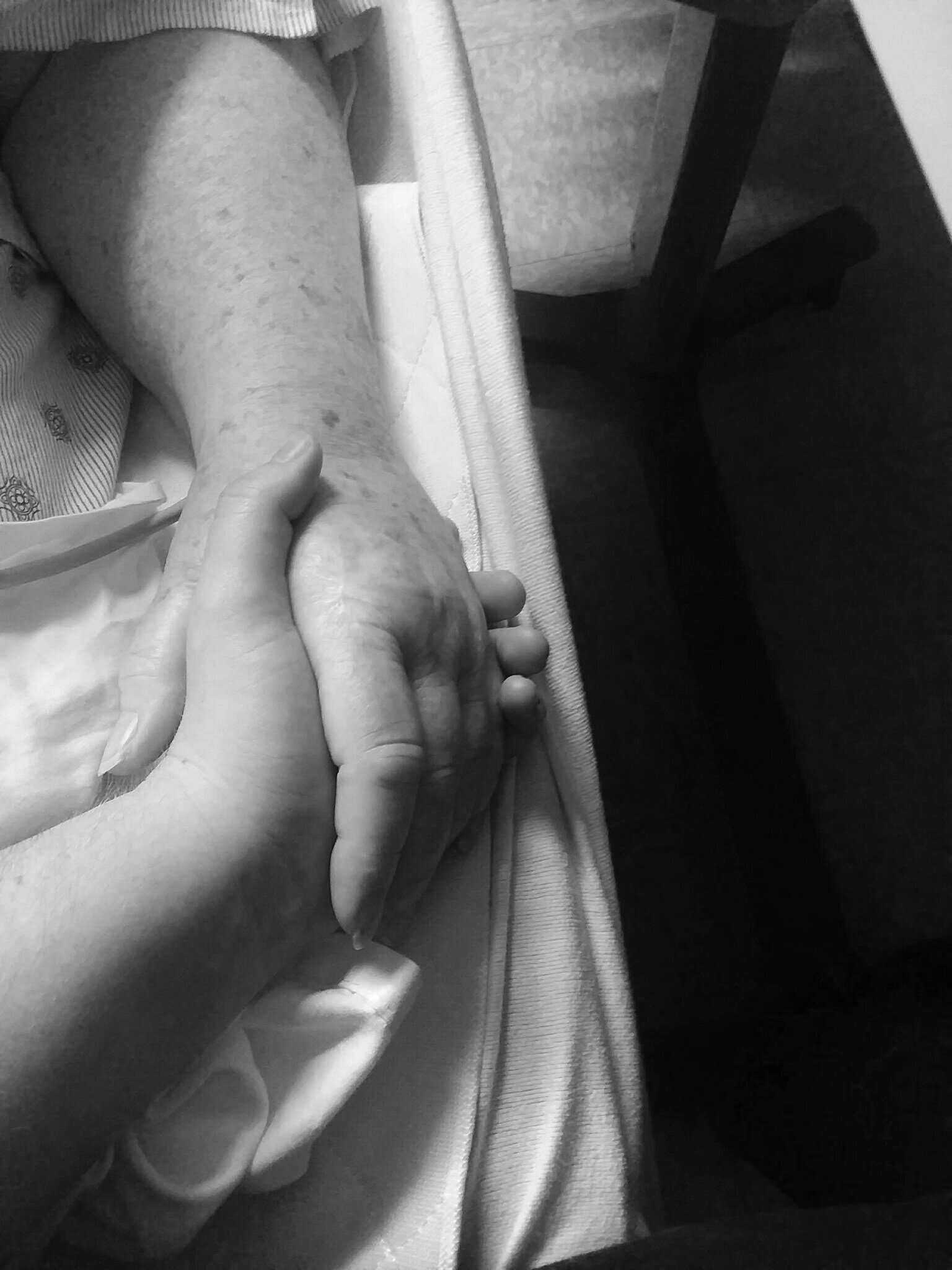Secret Code
Elizabeth Hoyle
My mother and I had a secret code. Maybe not so secret. She did the same thing with my older brother, and probably with my father. But I think she and I used the code the most, though, so that’s why I call it ours. It was simple: whenever we held hands, for any length of time, we’d squeeze each other’s fingers before we let go. Our code meant many things in different places at different times. I love you. It’ll be okay. I’m here. You’re here. It’s okay to hold my hand while the news is on. Stay awake, the priest’s homily is almost done. Have a good day at school. Good night. The nightmare is over, you can go back to sleep now.
In the summer of 2012, not two weeks after I graduated from high school, my mother got inexplicably sick. One day she was fine, the next she fell in the shower and couldn’t get up. When I finally helped her out of the tub, she was disoriented, and feeling worse throughout the day until she asked us to call her an ambulance. By the end of the following day she was diagnosed with septicemia brought on by a lingering UTI. They put her on a ventilator.
I was under no illusions that my mother was immortal. She’d lost my grandmother when I was seven and I grew up knowing that, in time, death comes for us all, and it is often preceded by sickness. What I did not know was that there was no way to prepare yourself for any of it.
My memories from that time are a blend of fear, guilt, and exhaustion. One memory, however, stands out clearly. It was about two weeks into the three Mom spent on the ventilator. Dad was talking to one of the attending doctors or nurses while I stood by her bed, holding her hand and trying to see her face through all the tubing, squeezing her hand to let her know that I was there, unsure if she could feel me. It seemed like such a strange thing to do, trying to evoke a response when she was so far away, but I couldn’t help it.
She squeezed back. I grasped her fingers again, certain it had been an involuntary reflex. She squeezed my hand a second time, and though I knew she probably didn’t do it on purpose, I felt she would be alright after that, despite her difficult prognosis.
Ultimately, she was alright, though she was never the same.
I didn’t tell anyone about that exchange in the ICU out of fear that they’d tell me I was as foolish as I thought I was for believing all would be well because of a squeeze of the hand. Hope doesn’t always make sense. I kept it to myself and focused on things I felt I could control, such as getting ready for college. It was only later that I realized that sometimes even the smallest things give us great hope, simply because our hearts need something to hold onto. And that is totally okay. It is more than okay. It is necessary for survival.
Years passed. What for my mother had begun as a lingering UTI had progressed into multiple kidney infections, which led to her getting one of her kidneys removed in 2014. She had several more kidney infections before getting diagnosed with endometrial cancer in 2018. Radiation paved the way to remission while yielding even more infections, stents in her kidney, and, eventually, the necessity of a nephrostomy tube. My hands became skilled at hooking up at-home IV antibiotic treatments and changing bandages around tubing. My mother’s hands remained as warm and as strong as they ever were, though they sometimes shook when she was really sick.
This past April, she had gone to the hospital to get her nephrostomy changed, such a routine procedure that I thought nothing about it. It was 2021. She’d had the nephrostomy for two, almost three years now. Dad was the one who thought there was something else going on when he saw the way she shook as he brought her home, despite her protests that she was just cold. She fell again, in the yard this time. She left with the EMTs who came to help us stand her up.
It’s only as I write this that I realize how similar the end was to the beginning. We got a call that night to let us know that she’d been admitted with another infection. Even then I didn’t think too much of it. How could one little infection be too bad when she’d survived so much worse? The next evening, we got another phone call. Respiratory arrest and eight minutes of resuscitation couldn’t be ignored so easily.
The last time I saw my mother alive she didn’t know me, or anyone. Or at least, if she did, she had no way to tell us. She stared at the ceiling, barely blinking, barely breathing, even with the ventilator. Despite how afraid I was, I couldn’t help but notice how I’d never seen her eyes look bluer. I said the words I knew I’d need to say someday. That if she needed to go, she could. My father loved her, my brother loved her, I loved her. We would miss her terribly but we would be alright. I kept clutching her hands, trying to reach her like before, trying to use our code to let her know it was okay. It didn’t work; her swollen fingers remained limp and cool in mine. Before leaving the hospital, I squeezed her hand one more time. No response.
There was a third and final phone call about an hour later. She’d let go.
Elizabeth Hoyle lives in southern West Virginia. Her fiction has been featured in Seaborne Magazine, Second Chance Lit, and other publications. Her poetry has been featured in Versification and Neuro Logical Literary Magazine, among other places. She has work forthcoming from The Eunoia Review and Sledgehammer Lit.


